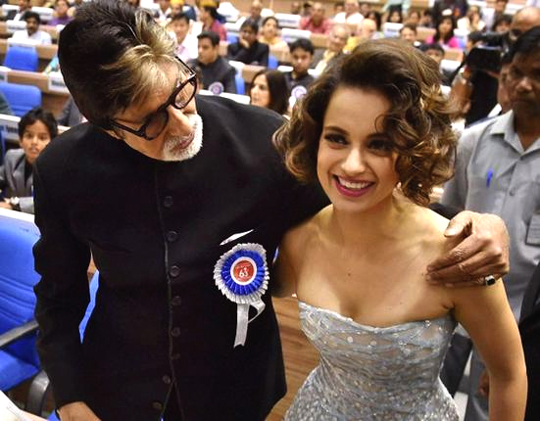New Delhi, May 4: Bollywood actor Amitabh Bachchan was on Tuesday accompanied by his family members to the 63rd National Film Awards ceremony here, where the megastar received the best actor honour for his role of a hypochondriac father in Piku.
Actor Kangana Ranaut too turned up with her father, mother, sister and brother to receive the best actress award for Tanu Weds Manu Returns.
Veteran film actor and director Manoj Kumar was given the 47th Dadasaheb Phalke Award. Known for featuring in films with patriotic themes, Manoj Kumar presented a Sai Baba idol to President Pranab Mukherjee.
The 78-year-old looked frail in a wheelchair, but was in high spirits as he waved to the cheering crowd when he got on to the stage. The President honoured the cine icon, whose career began in 1957.
A five-member jury — Lata Mangeshkar, Asha Bhosle, Salim Khan, Nitin Mukesh and Anup Jalota — unanimously recommended Manoj Kumar for the prestigious award this year.
The Dadasaheb Phalke Award is given by the government of India for outstanding contribution to the growth and development of Indian cinema. The award consists of a Swarn Kamal (Golden Lotus), a cash prize of Rs.10 lakh and a shawl.
Bachchan’s moment
It was Big B’s fourth National award. His son Abhishek Bachchan, daughter-in-law Aishwarya Rai Bachchan, wife Jaya Bachchan and daughter Shweta Nanda turned up at the ceremony to cheer for the actor. His previous National awards were for his performances in Agneepath, Black and Paa. One of the most sought-after stars in Bollywood, the actor will next be seen in Te3n and Shoojit Sircar’s Pink.
Kangana’s father ‘proud’
Kangana’s father Amardeep Ranaut said it was a proud moment to see his daughter receive her third National Award from the President. “I am very happy. I am a proud father and it is a matter of great pride,” Mr. Ranaut said.
The 29-year-old actor stood out in a pink off-shoulder gown from Beirut-based Lebanese designer Georges Chakra. Kangana teamed her gown with a classic bob, which is similar to the look she will be seen sporting in her upcoming film Rangoon.
Unlike the traditional attire opted by Indian celebrities for such events, Kangana usually goes for international couture. She had opted for a dusty pink gown by India-born designer Bibhu Mohapatra at the 2014 National Awards where she was honoured for her role in Queen. Her first National award was in the best supporting actress category for Fashion. Underlining unity: Pranab
Lauding film-makers for making movies that truly reflect Indian character, President Mukherjee said India had never allowed divergence to create disunity as its people always found unity.
“We did never believe in exclusion, always in inclusion. We did never allow divergence to create disunity. We celebrated divergence because it always finds an underlining unity,” he said.
He expressed his gratefulness to Indian cinema and its doyens from past to present who are also contributing to make “Indian films truly reflective of Indian character of unity amidst diversity.”
Mr. Mukherjee also noted that the Indian film industry, though it has had its ups and downs, has made progress technologically and was also doing well financially.
The President said he had learnt that the domestic revenues of the film industry have risen to Rs. 138 billion in 2015, up from Rs. 126 billion the year before. Even the overseas revenues have grown from Rs. 8.6 billion in 2014 to Rs. 9.6 billion in 2015.
“I am very happy that this time there are a lot of newcomers, who have won awards and what makes it more special is that there are legends, living legends, like Mr. Amitabh Bachchan, who have been honoured too,” the President said.
Mr. Mukherjee said he sometimes marvelled at the varieties of Indian films, adding that managing India in itself was a challenge as it is country with 1.2 billion people who everyday speak 122 languages, 1,800 dialects, follow seven religions and belong to three major ethnic groups. It is a huge diversity living as one administrative system, under one Constitution and one national flag, he said.







Comments
Add new comment